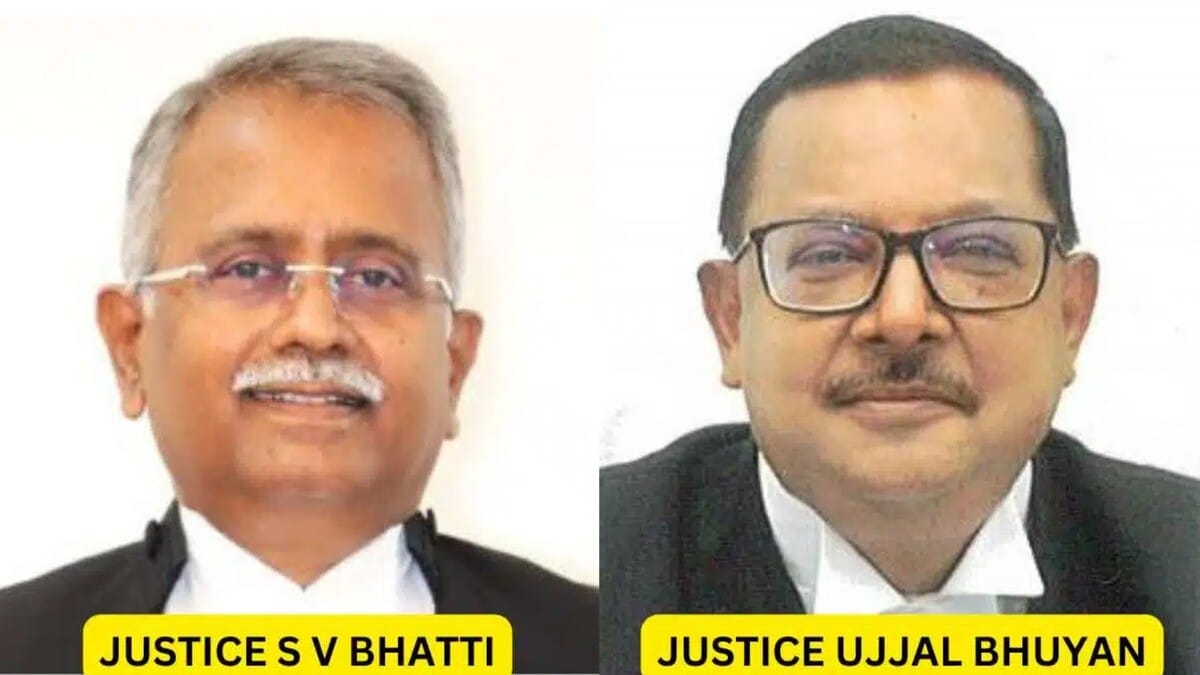On Wednesday, two chief justices of high courts were raised to the position of judges of the Supreme Court, days after the Supreme Court Collegium proposed their names.
Justices Ujjal Bhuyan and S Venkatanarayana Bhatti were appointed, according to tweets from Law Minister Arjun Ram Meghwal.
The Supreme Court Collegium recommended Justice Bhuyan, the Telangana High Court’s chief justice, and Justice Bhatti, his equivalent in Kerala, for promotion to the highest court on July 5.
Although the Supreme Court is officially authorised to have 34 justices, including the Chief Justice of India, it now only has 30. The Supreme Court’s working strength would increase to 32 once the two justices take their oaths, leaving two vacancies available. Justice Bhuyan, who was born on August 2, 1964, is the senior-most judge of the Gauhati High Court, his parent high court, and was appointed as a judge on October 17, 2011. Since June 28, 2022, he has held the position of Chief Justice of the Telangana High Court.
Justice Bhuyan has accumulated extensive knowledge in a variety of legal areas throughout the course of his protracted service as a High Court judge. In the field of tax law, he has developed expertise and subject knowledge. Additionally, he has handled a variety of matters, including taxes, as a Bombay High Court judge. His rulings deal with a wide range of legal and judicial concerns. The collegium had cited Justice Ujjal Bhuyan as a judge having a solid reputation for competence and honesty.
The senior-most judge in his parent high court, Justice Bhatti, who was born on May 6, 1962, was appointed to the High Court of Andhra Pradesh on April 12. The collegium remarked that since August 2022, the High Court of Andhra Pradesh has not been represented on the Supreme Court’s bench.
Since June 1, judge Bhatti has been the chief judge of the Kerala High Court since being moved there in March 2019.
Justice Bhatti has accumulated significant knowledge in a variety of legal fields throughout his lengthy tenure as a judge of the High Court of Andhra High Pradesh and as a judge and then as Chief Justice of the High Court of Kerala.
His legal expertise and ability are attested to by the judgements he has written dealing with problems in numerous legal fields. The appointment of Justice Bhatti would offer value in terms of his gained knowledge and expertise in addition to providing representation for the State of Andhra Pradesh. He has honesty, is competent, and commands a good reputation, according to the Collegium.
According to the resolution, when formulating its recommendations, the collegium took into account both the total seniority of the high court judges as well as the seniority of the chief justices and senior puisne judges in each of their separate parent high courts.
Additionally, the merit, performance, and integrity of the judges under consideration have been considered, as well as the need to ensure diversity and inclusion in the top court, representation of high courts that are underrepresented or not represented at all in the top court, the appointment of people from marginalised and backward segments of society, gender diversity, and minority representation.


